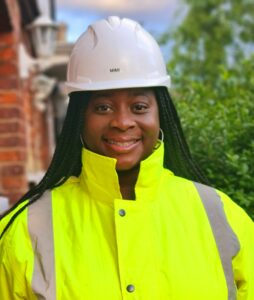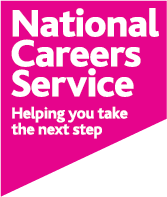The next chapter in our Career Breakers series features Civil Engineer, Mimi Nwosu, who talks us through her journey from overcoming A-level challenges to becoming a distinguished, multi-award-winning professional. Join us as Mimi shares her experiences, triumphs, and insights into fostering diversity and inclusion in the male-dominated field of civil engineering.
 Name: Mimi Nwosu
Name: Mimi Nwosu
Job Title: Civil Engineer
10 years ago, I started my A-levels with high hopes of becoming a medical professional. A-levels were the hardest period of my education. Still hopeful I completed my A-levels in Biology, Chemistry, Psychology and Religious Studies; however, I didn’t meet the grade requirements to study the course I wanted.
I went through the clearing process and was desperate to go to university, so I studied a science course I had ZERO interest in. After a few months, I knew the course wasn’t for me and started looking at other alternatives. I even considered dropping out completely.
Through a chance encounter, I found myself in a lecture that changed my outlook of the university experience. I was invited to a lecture by a friend, without asking what course he studied, I followed him. The course was male-dominated and had only 2 women.
Before I could ask the lecture had started. The topic of the lecture was bridge design and construction methods. I made 3 pages of notes and started to raise my hand to ask questions. The lecturer asked to speak to me after the lecture. He asked me if I had knowledge of Civil Engineering and what course I came from.
After 15 minutes of conversation with the lecturer and little (I like to take risks) research, I decided to transfer to the University of Portsmouth and study Civil Engineering. I was worried, as I didn’t have the prerequisite A-level subjects to study Civil Engineering (maths and physics) but I was very determined to achieve the best results and challenge myself. I appreciated the university’s faith in me.
I decided to cover all the areas of Civil Engineering; geotechnical, structural, environmental engineering and construction management modules.
A lecturer who always inspired and motivated me whilst at university is Dr Lee Woods. During my degree, I went through some tough times, and Dr Woods always made time to speak to me, advised me, exposed me to various university services and post-graduation has kept in contact with me. I will always be grateful for his kind words and support.
After the support and advice of Dr Woods, I decided it was important for me to take a placement year. I completed a 16-month placement with a global construction management firm in central London as an Undergraduate Engineer. I worked in a multidisciplinary team of 50 and over 100 subcontractors onsite. My role included on-site management, ensuring all works met deadlines and to were budget. I never thought of the processes within construction because I only saw the finished product.
The pressure of meeting deadlines and changing my mindset from a student to a working professional kept me on my toes, allowed me to develop on skills and showed me the practical application of my degree. This experience would later allow me to complete my studies and prepare for my future career.
I completed my placement year and felt more than prepared to finish my degree. My favourite module at university was ‘Soils and Materials’ I have always been interested in sustainable development and wanted to design and build for a better future – I knew material science would pioneer this!
For my final year project, I explored concrete technology and fire engineering. I completed a 15,000-word dissertation and a laboratory experiment titled: “Investigating the mechanical properties of Ultra-high-performance fibre reinforced concrete (UHPFRC) at elevated temperatures”.
I achieved a first-class for my project and in the overall module. I fell in love with concrete technology and its complexities and decided I wanted to become a Concrete Engineer.
During my final year, I started to apply for graduate roles. I enjoyed the application process. I felt that my placement year had put me at a great advantage as I had relevant experience in the industry as well as 4-years of experience in the retail environment. I was invited to numerous interviews and assessment centres; I was able to confidently talk about my experiences. I was offered 5 jobs before graduation; this gave me freedom as I could fully focus on my degree.
I graduated from university in 2018 with an upper second class (2:1) and accepted a role as a Graduate Highways Engineer for a global engineering consultancy. During that time was able to improve upon my communication, technical, AutoCAD, and leadership skills. I worked on various highway projects which meant I was able to liaise with different people, attend site visits, and work with individuals across the globe.
A career in engineering has awarded me such a diverse career path and transferable skills have enabled me to work in a variety of sectors within engineering.
Now, I am a Civil Engineer at Heathrow Airport, working on several large and small schemes to ensure the safety of our passengers and civil engineering assets such as terminal buildings, bridges, runways, tunnels, and pavements. I can see the full lifecycle of projects which is fulfilling.
One significant challenge I encountered was because I didn’t study Maths and Physics at A-Level, which made me have imposter syndrome whilst at university. However, with my determination and support from the university, I was able to achieve a second upper-class degree! I strongly believe the university believed in me more than I believed in myself. Because of this I wanted to make them and myself proud.
During my placement year in a global construction management firm, I faced the pressure of meeting deadlines and transitioning from a student to a working professional. The experience not only enhanced my skills but also prepared me for my future career.
A great success has been becoming a multi-award-winning engineer and having amazing opportunities to collaborate with TV networks such as BBC, ITV, and The Smithsonian Channel to create programs to motivate the next generation to consider a career in civil engineering.
I have been named:
The field of Civil Engineering is traditionally male-dominated. However, with the support of mentors like Dr. Lee Woods, Women in Engineering groups, friends, family, and my determination, I overcame any biases.
During my career, I’ve actively used my voice to encourage diversity and challenge stereotypes. I create content with various organisations to smash these stereotypes. Notably my Myths vs Reality: Engineering Edition, myth-busting content which reached millions of people across social media, and from this I have been involved in several initiatives to champion diversity.
During my career I have also joined many networks such as Women in Engineering Society (WES), Black Women in Engineering (BWEng), and many others to meet other inspiring women in engineering, it has been important for me to remember I am not alone and there are plenty of women and male allies who will always be there to support me and I have also kept in contact with my university. Without my university, I wouldn’t be where I am today.
I love using my voice and experiences to encourage the younger generation to consider a career in construction.
Studying Civil Engineering is a decision that I will NEVER regret. It has changed my whole life, my mindset, the way I view the world and it has made me want to explore the beautiful world we live in. I’ve started solo travelling and it has taken me to all corners of the earth. I love how diverse the world is, diversity is what makes us all unique. I love learning about architecture, languages, dabbling in photography and really try to engross myself into the culture of the countries I visit.
My advice to individuals wanting to join the industry:
DEI is so broad and wears many hats. I think the construction/engineering industry has made changes since I joined until now, which is good. Organisations must continue to use the HR policies and procedures they have in place to reprimand unacceptable behaviours.
DEI starts from the top down in organisations. Senior leadership teams need to actively engage in DEI strategies, workshops, and activities. Listen to employees and implement their suggestions. I think some of these conversations may be tough, but it is important to start having them.
I think it’s great there are so many role models in the industry, showcasing what a career in engineering can look like through social media. Social media has been fantastic in driving this type of content. On this front, the industry should engage these individuals to see how they can work together. Social media will allow the industry to reach millions of people a day.
The industry needs to actively seek advice and work closely with DEI organisations (there are plenty) who can help set a strategy and identify gaps where companies may require some more assistance.
This can be through recruitment practices, inclusive job descriptions, objective selection processes, and providing mentoring and support for their employees.
Follow the Career Breakers series on our website throughout January to stay connected with these empowering stories of individuals who have reshaped their careers and challenged gender stereotypes. For real-time updates, connect with us on social media using the hashtag #CareerBreakers.
The National Careers Service provides free, up to date, impartial information, advice and guidance on careers, skills and the labour market in England to anyone aged 13 and upwards. To speak to a National Careers Service adviser, call 0800 100 900 or use our webchat. Lines are available from: 8am – 8pm Monday – Friday, and 10am – 5pm Saturday
